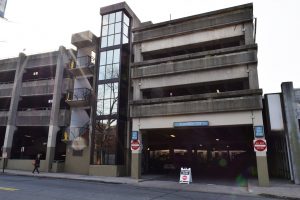AÂ legal logjam that has stymied a residential development in Mount Vernon has broken, and the way the conflict resolved could change the way the city cultivates commerce.
Mayor Richard Thomas brokered negotiations between well-heeled New York City developers who were fighting over parking.
The dispute was having a chilling effect on development, Thomas said, and last spring he intervened “to have a conversation, not litigation.”
On one side were Alexander Development of Manhattan and the Bluestone Organization of Jamaica, Queens. They had been cleared to build a 16-floor, 249-apartment building at 42 Broad St. West in the city”™s Fleetwood section.
On the other side were Bronx-based developer Joseph Simone and Manhattan developer Ralph Della Cava, who own and lease storefronts and offices near the proposed apartment building.
 Fleetwood Garage was at the center of the dispute. The city built the 4-story garage in 1979, operated it as a public facility, leased the air rights but did not own the land.
Fleetwood Garage was at the center of the dispute. The city built the 4-story garage in 1979, operated it as a public facility, leased the air rights but did not own the land.
Alexander Development bought the garage for $3.2 million in 2014 to provide parking for future residential tenants. The developers also planned to create 15,000 square feet of retail space on the ground floor.
But merchants in parking-scarce Fleetwood rely on the garage for their customers. Simone and Della Cava sued to stop the project and by last spring the case was in state appeals court.
Thomas said both sides seemed committed to fighting it out in the courts for a long time.
He saw an opportunity. Deadlines were looming. The judge could issue an opinion at any time. The 42 Broad developers were running out of time to finance their project.
Thomas urged the landlords and developers to de-escalate their dispute, to find common ground, to see the broader interests of the city in creating a thriving business sector.
In July, the Fleetwood landlords withdrew their appeal. Negotiations continued “inch by inch,” the mayor said, primarily over the parking garage.
Ultimately, the 42 Broad developers agreed to restore ground-floor parking for public use. That means they have to cut retail space and restructure their business plan.
Eight months ago, when groundbreaking was imminent, company President Mark Alexander estimated that 42 Broad would cost $85 million. Now he figures it will cost more than $90 million.
“The litigation itself was not too costly,” he said. “But the market for financing is not as strong as a year ago. In that sense, the delay caused by those proceedings was not helpful.”
Alexander said Westchester County is notorious for lengthy and challenging approval processes that have created pent-up demand and high prices.
Thomas also had a stake in the dispute. Last year, while serving on the city council, he voted on the losing side against legislation that relinquished the city”™s air rights to the garage.
Giving up air rights and operating rights was a bad decision, he said. Parking is tight everywhere and the city cannot afford to sacrifice public parking. But in the interest of making Fleetwood prosper, he set aside his sticking point.
The parking dilemma has prompted broader action. Just as public parking in Fleetwood is vital to every pizza shop, nail salon and restaurant, parking is crucial throughout the city. “There is no way to grow and sustain retail in the city,” Thomas said, “if there is no place to park.”
Thomas directed the city”™s Industrial Development Agency and Urban Renewal Agency to create a comprehensive parking plan. He has directed the police department to design decals for cars that could give Mount Vernon residents preferential parking. A city resident, for example, might get less restrictive parking at the three Metro-North train stations.
More broadly, Thomas said he hopes the 42 Broad deal will signal that projects can get done and businesses can thrive in Mount Vernon.
Alexander said he expects to close on financing and begin demolition and construction for 42 Broad by the end of January.




















